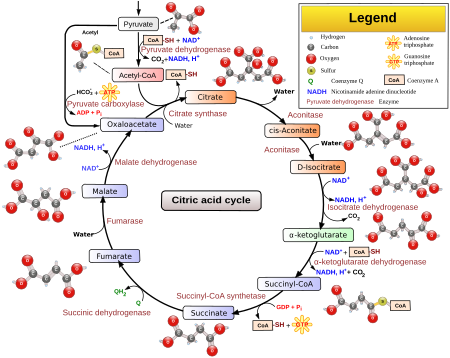I expect different things from students destined to go into hard science than those merely taking the course to fulfill some general university requirement. I could care less if my non-major student have memorized glycolysis as they will never (and I mean never) have to know that in the future. (Hint, I'm in a PhD program for microbiology and even I don't remember glycolysis). Other students may find this information essential later in life and would therefore be shamed and tortured for not knowing such "essential information". Sure, I may have been embarrassed at my qualifying exams for not knowing the Citric Acid cycle, but I hadn't used it prior to or since that time...if that tells you anything.
 |
| Citric Acid cycle - just in case I need to look it up at some point. |
In the age of the internet (and, well, since the invention of the written word), memorization of things that you'll probably never see again is a gigantic waste of time. If you're not going to rely on that information on a daily/weekly/monthly basis - just understand the foundations and look up the specifics when they're required. Basic memorization never sticks around, and institutions have known this for ages...but it still remains a primary focus in so many classes. But, enough digression, onto the goals for my students and what I promise to them.
In a non-majors course I want my students to understand the basic concepts and to have fun with the material. Students who are non-majors or are just starting out with any material shouldn't be bogged down with the nitty-gritty of it all. When you're first teaching someone to play a sport (take racquetball for instance) you don't go in and tell them specifically how to hit the ball and outline all the rules, you let them go in and smack the ball around for a few hours. If you start someone off with restrictions and regulations they won't have any fun with it. You have to let them find the best parts of the game, the parts that will make them want to come back and eventually want to learn the rules and regulations. This is what I want to convey to this type of student - science IS fun. Yes, it's learning, but it's also exploration and trying the dumbest things you can think of.
Did anyone ever tell me as an undergrad not to pour ethanol into a plastic petri dish and light it on fire? No! Should they have? Probably. But, my brief attempt to create a fire-resistant bacteria was probably the most fun I had with science during my studies. It is easy to lose sight of this as a professor, but I hope to get my students to both appreciate and understand (not memorize) the lessons and science that I'm giving them.
 |
| Dr. Frederick - the man, the myth, the pizzazz. |
My expectations for my majors students is much the same. My fondest (sarcasm!) memories in undergrad were listening to my professor drone on about something while I paid little attention in the back. This happened in ca. 80% of my courses during my undergraduate studies and I learned everything outside of class - because the professors were just as dry as the book! These professors seem to have lost what I hope to instill upon my students - the joy, the excitement, the pizzazz! Ok, maybe not the pizzazz. The reason I mention pizzazz is my favorite professor at the Rochester Institute of Technology (my undergrad institution). His name was Dr. Thomas Frederick and the man had it by the truckload. While he would talk on and on about immunology and IL-10 and all the others he still had that energy, that joy - and all of that transferred to his students (at 8am to boot). His enthusiasm for the material and his focus on making us see how interesting the topics were rubbed off on me, and I still remember most of the foundational concepts simply because I still think they're fascinating.
My expectations for my majors students is just that. I work hard to bring comedy and energy to my lectures and I expect you to learn what I teach, but I expect you to get caught up in it also. I won't make you memorize things for the sake of memorization, but I expect you to know the foundation concepts that are essential to understanding it, and be able to use those to understand the details and solve new problems that rely on similar ideas. I hate boring classes, and I hate when my students are bored.
My expectations for my majors students is just that. I work hard to bring comedy and energy to my lectures and I expect you to learn what I teach, but I expect you to get caught up in it also. I won't make you memorize things for the sake of memorization, but I expect you to know the foundation concepts that are essential to understanding it, and be able to use those to understand the details and solve new problems that rely on similar ideas. I hate boring classes, and I hate when my students are bored.
If you're bored, you aren't going to learn as well, and that's not alright with me.
No comments:
Post a Comment